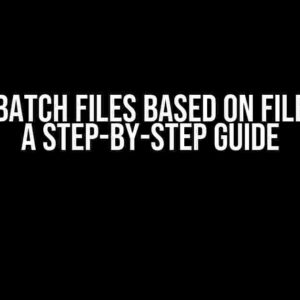Are you tired of throwing your hands up in the air, frustrated by the stubborn refusal of Rcpp to compile with RcppParallel on Windows? Fear not, dear R enthusiast, for we’ve got you covered! In this comprehensive guide, we’ll walk you through the process of taming the beast and getting Rcpp to play nice with RcppParallel on the Windows platform.
- Understanding the Problem: What’s Going On?
- Prerequisites: Getting Your System Ready
- Step 1: Update Your Rcpp Installation
- Step 2: Install RcppParallel
- Step 3: Configure Your C++ Compiler
- Step 4: Update Your RcppParallel Configuration
- Step 5: Compile Your Rcpp Code
- Common Issues and Solutions
- Conclusion
Understanding the Problem: What’s Going On?
Before we dive into the solution, it’s essential to understand what’s causing the issue in the first place. When you try to compile Rcpp with RcppParallel on Windows, you’re likely to encounter one of the following error messages:
Error: cannot compile 'src/your_file.cpp' to 'src/your_file.o'
Error: unable to load shared object 'C:/Path/To/Your/file.dll':
LoadLibrary failure: The specified procedure could not be found.The errors above are often symptoms of a deeper issue: the inability of Rcpp to find the necessary dependencies and libraries required for compilation with RcppParallel.
Prerequisites: Getting Your System Ready
Before we begin, ensure you have the following installed on your Windows system:
- R (the latest version)
- RStudio (the latest version)
- Rcpp (the latest version)
- RcppParallel (the latest version)
- A C++ compiler (e.g., Rtools or Microsoft Visual Studio)
- A decent cup of coffee (optional, but highly recommended)
Step 1: Update Your Rcpp Installation
The first step is to update your Rcpp installation to ensure you have the latest version. In RStudio, run the following command:
install.packages("Rcpp")This will update Rcpp to the latest version, which is essential for compatibility with RcppParallel.
Step 2: Install RcppParallel
Next, you’ll need to install RcppParallel. Run the following command in RStudio:
install.packages("RcppParallel")This will install the latest version of RcppParallel, which is designed to work seamlessly with Rcpp.
Step 3: Configure Your C++ Compiler
To compile Rcpp with RcppParallel, you’ll need to configure your C++ compiler. There are two options:
Option A: Rtools
If you’re using Rtools, ensure you have the latest version installed. You can check by running:
Sys.which("Rtools")If you don’t have Rtools installed, download and install the latest version from the official website.
Option B: Microsoft Visual Studio
If you prefer using Microsoft Visual Studio, make sure you have the necessary components installed:
- Visual Studio Community (or higher)
- Visual C++ Build Tools
- Windows 10 SDK (or higher)
In RStudio, run the following command to configure your compiler:
System.getenv("PATH") <- paste("C:/Program Files (x86)/Microsoft Visual Studio/2019/Community/VC/Tools/MSVC/14.29.30133/bin/Hostx64/x64;",
Sys.getenv("PATH"),
sep = ";")Replace the path with the actual location of your Visual Studio installation.
Step 4: Update Your RcppParallel Configuration
To ensure RcppParallel works seamlessly with Rcpp, update your RcppParallel configuration by running the following command:
RcppParallel::cppVarsAdd("CXXFLAGS", "-fopenmp")This command adds the necessary OpenMP flags to your RcppParallel configuration, allowing it to work with Rcpp.
Step 5: Compile Your Rcpp Code
Now that you've configured your system and updated your RcppParallel installation, it's time to compile your Rcpp code. Create a new R file (e.g., `your_file.R`) and add the following code:
library(Rcpp)
library(RcppParallel)
Sys.setenv(PATH = paste("C:/Rcpp/your_file.o", Sys.getenv("PATH"), sep = ";"))
src <- 'your_file.cpp'
system(paste("R CMD SHLIB ", src))
Replace `your_file.cpp` with the actual path to your C++ file. This code compiles your Rcpp file using RcppParallel.
Common Issues and Solutions
While following the steps above should resolve the issue, you might encounter some common problems. Here are some solutions to get you back on track:
| Error Message | Solution |
|---|---|
| Undefined symbols for architecture x86_64 | Check that you have the necessary dependencies installed, including OpenMP. If using Rtools, ensure you have the latest version installed. |
| Cannot find -lomp | Verify that you have OpenMP installed and configured correctly. If using Microsoft Visual Studio, ensure you have the necessary components installed. |
| Error: unable to load shared object 'C:/Path/To/Your/file.dll' | Check that your RcppParallel configuration is correct, and you've updated your Rcpp installation to the latest version. |
Conclusion
Compiling Rcpp with RcppParallel on Windows can be a daunting task, but by following the steps outlined in this guide, you should be able to overcome the hurdles and get your code up and running. Remember to update your Rcpp installation, configure your C++ compiler, update your RcppParallel configuration, and compile your Rcpp code carefully.
With patience, persistence, and a healthy dose of caffeine, you'll be conquering the beast in no time. Happy coding!
Frequently Asked Question
Get stuck with RcppParallel on Windows? Don't worry, we've got you covered!
Why can't I compile my RcppParallel code on Windows?
This is likely due to the lack of OpenMP support in the default R distribution on Windows. RcppParallel requires OpenMP to work its magic, so you'll need to install a compiler that supports OpenMP, such as Rtools40 or later. Then, reinstall RcppParallel, and you should be good to go!
I've installed Rtools40, but I'm still getting errors. What's going on?
Double-check that you've added the Rtools40 bin directory to your system's PATH environment variable. This will allow R to find the necessary compiler tools. If you're still stuck, try reinstalling RcppParallel with the `INSTALL_opts` argument set to `--enable-openmp` to force OpenMP support.
Do I need to modify my RcppParallel code to work on Windows?
Nope! RcppParallel is designed to be platform-agnostic, so your code should work as-is on Windows, provided you've installed the necessary compiler tools. Just make sure to reinstall RcppParallel after setting up Rtools40, and you're ready to parallelize!
I'm using an older version of RcppParallel. Will that work on Windows?
Unfortunately, older versions of RcppParallel might not support OpenMP on Windows. It's recommended to update to the latest version of RcppParallel to ensure compatibility with the Rtools40 compiler.
Where can I find more resources on using RcppParallel on Windows?
The RcppParallel documentation and the RcppParallel GitHub page are great resources to get you started. You can also search for tutorials and forums dedicated to using RcppParallel on Windows. If you're still stuck, don't hesitate to reach out to the RcppParallel community for help!


